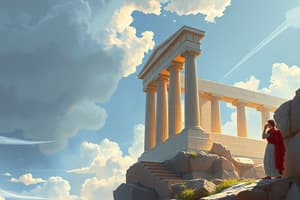Podcast
Questions and Answers
Explain the key characteristics of the Classical period of ancient Greece.
Explain the key characteristics of the Classical period of ancient Greece.
The Classical period of ancient Greece, from around 480 to 323 BCE, was characterized by significant advancements in art, architecture, philosophy, and politics. Key features include the development of democracy, the flourishing of Greek drama and literature, and the construction of iconic buildings such as the Parthenon.
What were the major contributions of ancient Greece during the Classical period?
What were the major contributions of ancient Greece during the Classical period?
During the Classical period, ancient Greece made significant contributions to philosophy, mathematics, science, and the arts. Philosophers like Socrates, Plato, and Aristotle laid the foundation for Western philosophy, while mathematicians like Euclid made pioneering advancements. In the arts, Greek drama, sculpture, and architecture reached new heights, leaving a lasting impact on Western culture.
How did the Classical period of ancient Greece influence modern society?
How did the Classical period of ancient Greece influence modern society?
The Classical period of ancient Greece continues to influence modern society in various ways. Its democratic principles, philosophical ideas, architectural styles, and artistic achievements have shaped Western civilization. Concepts such as democracy, the pursuit of knowledge, and artistic expression have become integral parts of contemporary society, making the Classical period a crucial part of our cultural heritage.
What are the main characteristics of the Classical period of ancient Greece?
What are the main characteristics of the Classical period of ancient Greece?
Who were some prominent figures from the Classical period of ancient Greece?
Who were some prominent figures from the Classical period of ancient Greece?
What were some significant events or developments during the Classical period of ancient Greece?
What were some significant events or developments during the Classical period of ancient Greece?
What were the major city-states during the Classical period of ancient Greece?
What were the major city-states during the Classical period of ancient Greece?
Who were some prominent figures in the Classical period of ancient Greece?
Who were some prominent figures in the Classical period of ancient Greece?
What were the significant achievements in art and architecture during the Classical period of ancient Greece?
What were the significant achievements in art and architecture during the Classical period of ancient Greece?
Flashcards are hidden until you start studying
Study Notes
Characteristics of the Classical Period
- Lasted from 500 BCE to 323 BCE
- Marked by cultural, philosophical, and artistic achievements
- Cities became more organized, with Athens and Sparta emerging as major powers
Major Contributions
- Democracy was born in Athens, with the establishment of the Ecclesia (citizens' assembly)
- Development of philosophy, with prominent figures like Socrates, Plato, and Aristotle
- Contributions to theater, with Aeschylus, Sophocles, and Euripides
- Architectural innovations, with the development of the Doric, Ionic, and Corinthian orders
- Advances in medicine, mathematics, and astronomy
Influence on Modern Society
- Democracy and philosophy continue to shape modern politics and thought
- Theater and the arts continue to be influenced by Classical Greek forms
- Architectural styles continue to draw on Classical Greek innovations
- Scientific discoveries built upon ancient Greek foundations
Prominent Figures
- Socrates, Plato, and Aristotle (philosophers)
- Pericles (statesman and general)
- Sophocles and Euripides (playwrights)
- Aeschylus (playwright and founder of tragedy)
- Phidias (sculptor)
- Hippocrates (physician)
Significant Events and Developments
- Persian Wars (492-449 BCE), in which Greeks defended against Persian invasions
- Peloponnesian War (431-404 BCE), a devastating conflict between Athens and Sparta
- Development of the Athenian Empire, with the Delian League
- Construction of the Parthenon and other iconic buildings
Major City-States
- Athens, a center of culture and learning
- Sparta, a military powerhouse
- Corinth, a commercial hub
- Thebes, a major city-state in Boeotia
Achievements in Art and Architecture
- Development of the Doric, Ionic, and Corinthian orders
- Creation of iconic buildings like the Parthenon and the Temple of Olympian Zeus
- Advancements in sculpture, with famous works like Phidias' Athena Parthenos
- Innovations in pottery and vase painting
Studying That Suits You
Use AI to generate personalized quizzes and flashcards to suit your learning preferences.




